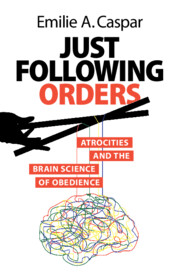Refine search
Actions for selected content:
37 results
Chapter 5 - How the Trouble Starts in Paradise Lost
-
- Book:
- Milton's Strenuous Liberty
- Published online:
- 23 October 2025
- Print publication:
- 06 November 2025, pp 126-155
-
- Chapter
- Export citation
Tax compliance and obedience to authority at home and in the lab: A new experimental approach
-
- Journal:
- Experimental Economics / Volume 9 / Issue 4 / December 2006
- Published online by Cambridge University Press:
- 14 March 2025, pp. 343-359
-
- Article
- Export citation
Chapter 5 - Passive Learning
- from Part II - Risk and Learning
-
- Book:
- Stochastic Choice Theory
- Published online:
- 14 January 2025
- Print publication:
- 23 January 2025, pp 62-82
-
- Chapter
- Export citation
17 - Early Modernizers of Politics
- from Part V - Democracy beyond Modernity
-
- Book:
- Can Democracy Recover?
- Published online:
- 02 January 2025
- Print publication:
- 16 January 2025, pp 165-179
-
- Chapter
- Export citation
4 - Norms, Group Pressures, and Deviancy
- from Part II - How Groups Function
-
- Book:
- Groups
- Published online:
- 12 December 2024
- Print publication:
- 05 December 2024, pp 71-92
-
- Chapter
- Export citation

Just Following Orders
- Atrocities and the Brain Science of Obedience
-
- Published online:
- 25 July 2024
- Print publication:
- 25 July 2024
Chapter 5 - Just Giving Orders? In the Brains of Those Who Command
-
- Book:
- Just Following Orders
- Published online:
- 25 July 2024
- Print publication:
- 25 July 2024, pp 147-167
-
- Chapter
- Export citation
Introduction: Understanding Genocide as a Means to Prevention
-
- Book:
- Just Following Orders
- Published online:
- 25 July 2024
- Print publication:
- 25 July 2024, pp 1-26
-
- Chapter
- Export citation
Chapter 2 - A Brief History of the Experimental Research on Obedience
-
- Book:
- Just Following Orders
- Published online:
- 25 July 2024
- Print publication:
- 25 July 2024, pp 57-86
-
- Chapter
- Export citation
3 - Defining Duty
- from Part II - Social Groups
-
- Book:
- Making Sense of the Great War
- Published online:
- 11 April 2024
- Print publication:
- 18 April 2024, pp 119-159
-
- Chapter
- Export citation
2 - Christian August Crusius
- from Part I - Pre-Kantian Moral Philosophy
-
- Book:
- Kant's <i>Critique of Practical Reason</i>
- Published online:
- 31 January 2025
- Print publication:
- 28 March 2024, pp 40-43
-
- Chapter
- Export citation
3 - Monastic Experience
-
- Book:
- Ways of Living Religion
- Published online:
- 07 March 2024
- Print publication:
- 14 March 2024, pp 90-130
-
- Chapter
- Export citation
3 - Thomas Hobbes and Instilled Conscience
-
- Book:
- The Coerced Conscience
- Published online:
- 07 December 2023
- Print publication:
- 21 December 2023, pp 41-68
-
- Chapter
- Export citation
Dog training methods: their use, effectiveness and interaction with behaviour and welfare
- Part of
-
- Journal:
- Animal Welfare / Volume 13 / Issue 1 / February 2004
- Published online by Cambridge University Press:
- 11 January 2023, pp. 63-69
-
- Article
-
- You have access
- Export citation
Chapter 9 - War as Transformative
- from Part II - Change Agents, in Theory and Practice
-
- Book:
- Political Plasticity
- Published online:
- 15 January 2023
- Print publication:
- 05 January 2023, pp 101-114
-
- Chapter
- Export citation
5 - The Nature of Sovereignty
- from Part II - Texts
-
- Book:
- Medieval Muslim Mirrors for Princes
- Published online:
- 15 January 2023
- Print publication:
- 05 January 2023, pp 85-142
-
- Chapter
- Export citation
Chapter 5 - Passivity
- from Part III - Political Agents and Novel Forms
-
- Book:
- <i>The Postsecular Restoration and the Making of Literary Conservatism</i>
- Published online:
- 22 June 2023
- Print publication:
- 22 December 2022, pp 177-210
-
- Chapter
- Export citation
Political Obligation and the Need for Justice
-
- Journal:
- Canadian Journal of Law & Jurisprudence / Volume 36 / Issue 1 / February 2023
- Published online by Cambridge University Press:
- 13 December 2022, pp. 195-214
-
- Article
-
- You have access
- Open access
- HTML
- Export citation
13 - Eternal Law, Natural Law, Natural Rights
- from Part II - Natural Law Foundations of Human Rights Obligations
-
-
- Book:
- The Cambridge Handbook of Natural Law and Human Rights
- Published online:
- 03 November 2022
- Print publication:
- 17 November 2022, pp 190-202
-
- Chapter
- Export citation
Herbert McCabe's Realism
-
- Journal:
- New Blackfriars / Volume 103 / Issue 1104 / March 2022
- Published online by Cambridge University Press:
- 01 January 2024, pp. 294-308
- Print publication:
- March 2022
-
- Article
- Export citation
